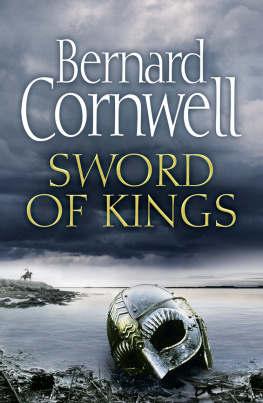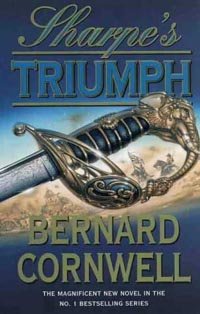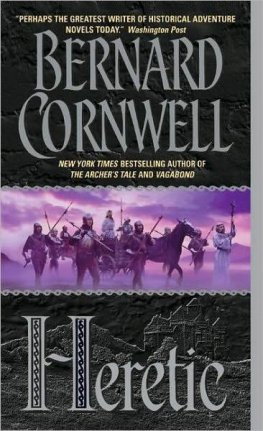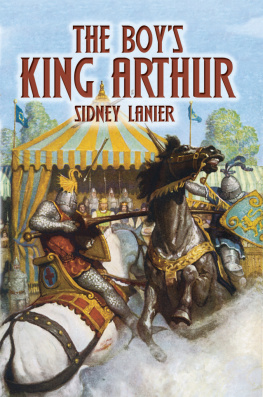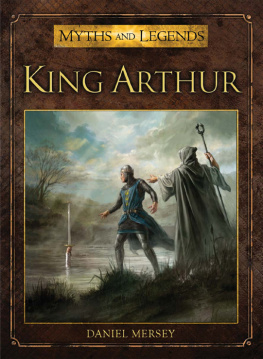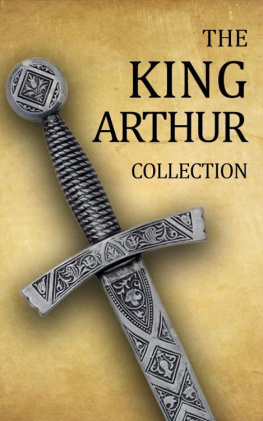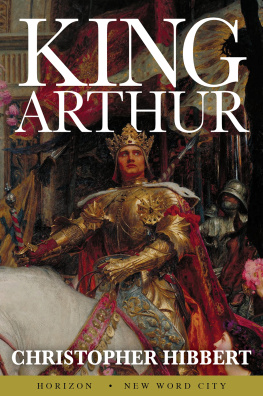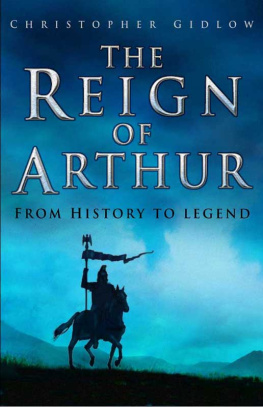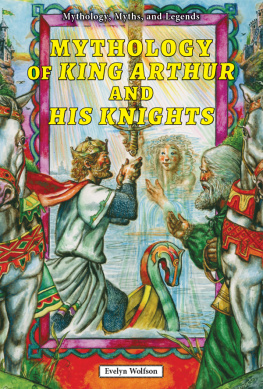ENEMY OF GOD
by Bernard Cornwell

Today I have been thinking about the dead. This is the last day of the old year. The bracken on the hill has turned brown, the elms at the valleys end have lost their leaves and the winter slaughter of our cattle has begun. Tonight is Samain Eve.
Tonight the curtain that separates the dead from the living will quiver, fray, and finally vanish. Tonight the dead will cross the bridge of swords. Tonight the dead will come from the Otherworld to this world, but we shall not see them. They will be shadows in darkness, mere whispers of wind in a windless night, but they will be here.
Bishop Sansum, the saint who rules our small community of monks, scoffs at this belief. The dead, he says, do not have shadow-bodies, nor can they cross the sword bridge, but instead they lie in their cold graves and wait for the final coming of our Lord Jesus Christ. It is proper, he says, for us to remember the dead and to pray for their immortal souls, but their bodies are gone. They are corrupt. Their eyes have melted to leave dark holes in their skulls, worms liquefy their bellies, and mould furs their bones. The saint insists that the dead do not trouble the living on Samain Eve, yet even he will take care to leave a loaf of bread beside the monastery hearth this night. He will pretend it is carelessness, but all the same there will be a loaf of bread and a pitcher of water beside the kitchen ashes tonight. I shall leave more. A cup of mead and a piece of salmon. They are small gifts, but all I can afford, and tonight I shall place them in the shadows by the hearth then go to my monks cell and welcome the dead who will come to this cold house on its bare hill.
I shall name the dead. Ceinwyn, Guinevere, Nimue, Merlin, Lancelot, Galahad, Dian, Sagramor; the list could fill two parchments. So many dead. Their footsteps will not stir a rush on the floor nor frighten the mice that live in the monasterys thatched roof, but even Bishop Sansum knows that our cats will arch their backs and hiss from the kitchen corners as the shadows that are not shadows come to our hearth to find the gifts that deter them from working mischief.
So today I have been thinking about the dead.
I am old now, maybe as old as Merlin was, though not nearly so wise. I think that Bishop Sansum and I are the only men living from the great days and I alone remember them fondly. Maybe some others still live. In Ireland, perhaps, or in the wastes north of Lothian, but I do not know of them, though this much I do know: that if any others do live, then they, like me, cower from the encroaching darkness like cats shrinking from this nights shadows. All that we loved is broken, all that we made is pulled down and all that we sowed is reaped by the Saxons. We British cling to the high western lands and talk of revenge, but there is no sword that will fight a great darkness. There are times, too frequent now, when all I want is to be with the dead. Bishop Sansum applauds that wish and tells me it is only right that I should yearn to be in heaven at Gods right hand, but I do not think I shall reach the saints heaven. I have sinned too much and thus fear hell, but still hope, against my faith, that I will pass to the Otherworld instead. For there, under the apple trees of four-towered Annwn, waits a table heaped with food and crowded with the shadowbodies of all my old friends. Merlin will be cajoling, lecturing, grumbling and mocking. Galahad will be bursting to interrupt and Culhwch, bored with so much talk, will steal a larger portion of beef and think no one notices. And Ceinwyn will be there, dear lovely Ceinwyn, bringing peace to the turmoil roused by Nimue.
But I am still cursed by breath. I live while my friends feast, and as long as I live I shall write this tale of Arthur. I write at the behest of Queen Igraine, the young wife of King Brochvael of Powys who is the protector of our small monastery. Igraine wanted to know all I can remember of Arthur and so I began to write these tales down, but Bishop Sansum disapproves of the task. He says Arthur was the Enemy of God, a spawn of the devil, and so I am writing the tales in my native Saxon tongue that the saint does not speak. Igraine and I have told the saint that I am writing the gospel of our Lord Jesus Christ in the enemys language and maybe he believes us, or maybe he is biding his time until he can prove our falsehood and then punish me.
I write each day. Igraine comes frequently to the monastery to pray that God will grant her womb the blessing of a child, and when her prayers are done she takes the finished skins away and has them translated into British by the clerk of Brochvaels justice. I think she changes the story then, making it match the Arthur she wants rather than the Arthur who was, but perhaps that does not matter for who will ever read this tale? I am like a man building a wall of mud and wattle to resist an imminent flood. The darkness comes when no man will read. There will just be Saxons.
So I write about the dead and the writing passes the time until I can join them; the time when Brother Derfel, a humble monk of Dinnewrac, will again be Lord Derfel Cadarn, Derfel the Mighty, Champion of Dumnonia and beloved friend of Arthur. But now I am just a cold old monk scribbling memories with my one remaining hand. And tonight is Samain Eve and tomorrow is a new year. The winter is coming. The dead leaves lie in shining drifts against the hedgerows, there are redwings in the stubble, gulls have flown inland from the sea and woodcock gather under the full moon. It is a good season, Igraine tells me, to write of old things and so she has brought me a fresh pile of skins, a flask of newly mixed ink and a sheaf of quills. Tell me of Arthur, she says, of golden Arthur, our last and best hope, our king who never was a king, the Enemy of God and the scourge of Saxons. Tell me of Arthur. A field after battle is a dreadful thing.
We had won, but there was no elation in our souls, just weariness and relief. We shivered about our fires and tried not to think of the ghouls and spirits that stalked the dark where the dead of Lugg Vale lay. Some of us slept, but none slept well for the nightmares of battles end harried us. I woke in the black hours, startled out of sleep by the memory of a spear thrust that had so nearly skewered my belly. Issa had saved me, pushing the enemys spear away with the edge of his shield, but I was haunted by what had so nearly happened. I tried to sleep again, but the memory of that spear thrust kept me awake, and so at last, shivering and weary, I stood and drew my cloak about me. The vale was lit by guttering fires, and in the dark between the flames there drifted a miasma of smoke and river mist. Some things moved in the smoke, but whether they were ghosts or the living I could not tell.
You cant sleep, Derfel? A voice spoke softly from the doorway of the Roman building where the body of King Gorfyddyd lay.
I turned to see it was Arthur who watched me. I cant sleep. Lord, I admitted. He picked his way through the sleeping warriors. He wore one of the long white cloaks that he liked so much and, in the fiery night, the garment seemed to shine. There was no mud on it, or any blood, and I realized he must have kept the cloak bundled safe for something clean to wear after battle. The rest of us would not have cared if we had ended the fight stark naked so long as we lived, but Arthur was ever a fastidious man. He was bare-headed and his hair still showed the indentations where the helmet had clasped his skull. I never sleep well after battle, he said, not for a week at least. Then comes a blessed night of rest. He smiled at me. I am in your debt.


